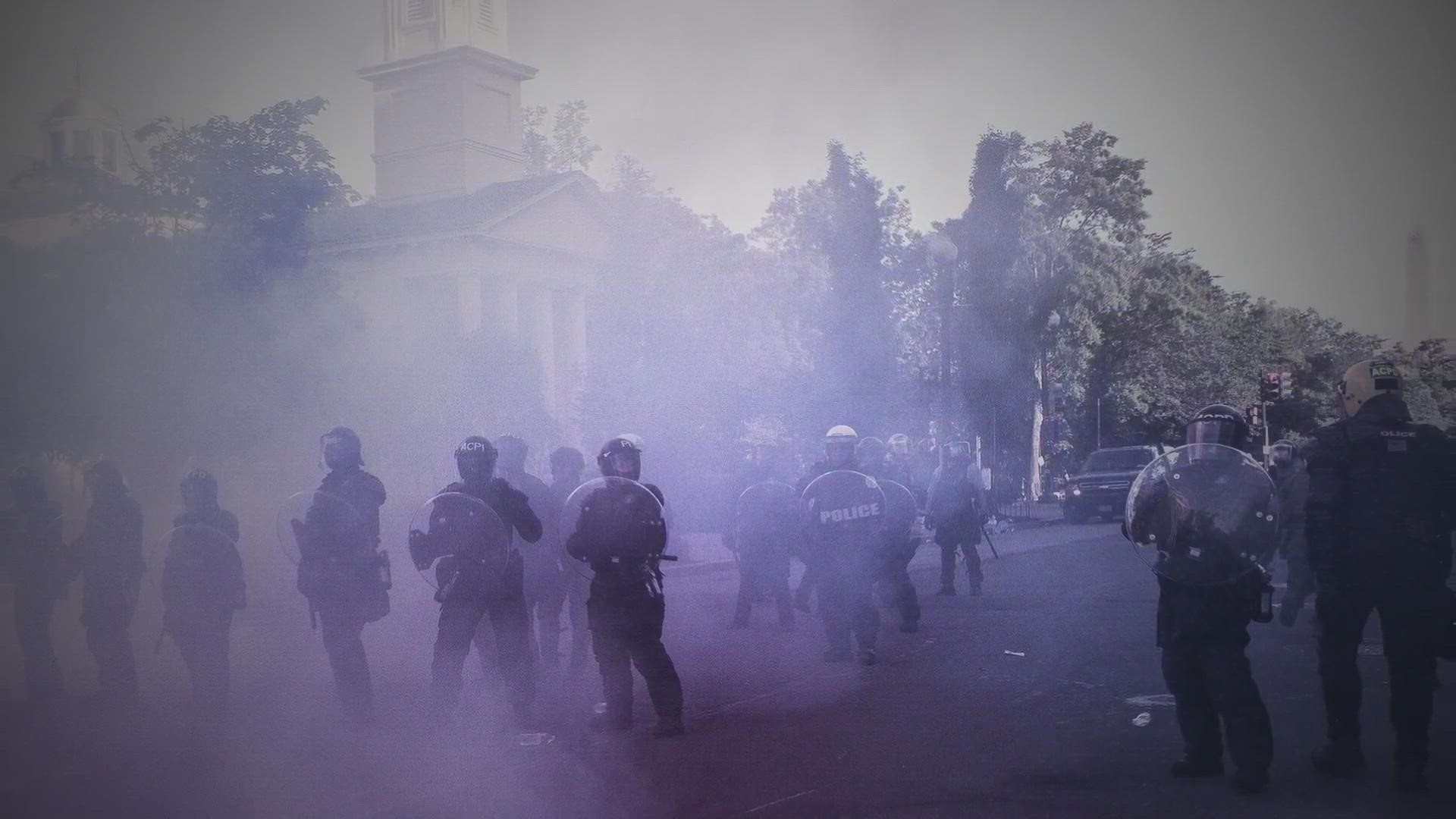WASHINGTON — U.S. Park Police and the U.S. Secret Service announced policy changes Wednesday to partially settle a lawsuit filed by Black Lives Matter advocates after protesters were tear-gassed in order to clear Lafayette Square back in 2020.
On June 1, 2020, D.C. was reeling from the murder of George Floyd, and protesters took to the streets to make their voices heard. Moments after addressing the nation from the Rose Garden, then-President Donald Trump left the White House to visit St. John's Church, a 200-year-old parish known as "the church of the presidents." To prepare for the president's surprise visit, a group of peaceful protesters in a nearby park were cleared out of the area using stinger ball grenades and larger tear gas canisters.
A coalition of civil rights groups and individual protesters sued the US Park Police and US Secret Service for their handling of the protesters.
The settlement resolves portions of four separate lawsuits after nearly two years of litigation on behalf of Black Lives Matter D.C. and 13 individual protesters by the American Civil Liberties Union of the District of Columbia, Washington Lawyers’ Committee for Civil Rights and Urban Affairs, Lawyers’ Committee for Civil Rights Under Law, and the law firms of Arnold & Porter; Gibson, Dunn & Crutcher LLP; and Regan Zambri Long.
Policy changes listed in the settlement and pointed out by ACLU DC include:
- Protecting the right to demonstrate by providing that Park Police cannot revoke demonstration permits absent “clear and present danger to the public safety,” or “widespread violations of applicable law that pose significant threat of injury to persons or property;”
- Protecting demonstrators by requiring Park Police to enable the safe withdrawal of demonstrators if a protest is being dispersed;
- Protecting demonstrators by requiring Park Police to provide audible warnings before dispersing a crowd;
- Promoting accountability by requiring Park Police to wear clearly visible identification;
- Protecting demonstrators from intimidation by prohibiting Park Police from displaying gas masks and shields at protests, unless approved by a high-ranking officer;
- Prohibiting discriminatory policing based on race, color, sex, national origin, religion, sexual orientation, gender identity or expression, disability, or viewpoint.
- Reducing the opportunity for "guilt-by-association" policing by modifying Secret Service policy to make clear that uses of force and dispersals are not normally justified by the unlawful conduct of some individuals in a crowd.
“The federal government is committed to the highest standards for protecting civil rights and civil liberties in any federal law enforcement response to public demonstrations,” said Associate Attorney General Vanita Gupta. “These changes to agency policies for protest responses will strengthen our commitment to protecting and respecting constitutionally protected rights,” Gupta added in a statement.
ACLU D.C.'s Scott Michelman called the settlement an "important victory for freedom of speech" and "freedom of dissent."
"We were able to get the Park Police to agree that only officials of a certain rank could authorize the use of CS gas," Michelman said. "And only officials of a certain rank could authorize the donning of gas masks and riot gear."
“From the steps of the Lincoln Memorial to the White House sidewalk, the National Park Service takes immense pride in caring for some of our nation’s most storied civic spaces,” said Director Chuck Sams of the National Park Service in a statement. “We hope this updated policy can serve as a model for others to uphold civil rights and facilitate safe demonstrations. It is good for the public and good for our officers. The United States Park Police is committed to ensuring people can gather safely to express our most fundamental and cherished right to free speech. This updated policy is designed to be accessible and understandable to both our officers and the public, further strengthening that commitment.”
Michelman warned that future administrations could always choose to reverse policies or make amendments.
"This is not a consent decree that is enforceable by a court," he said. "However, with policies like this, they have the power to change an institution's culture to change it to change just the way they do business."

